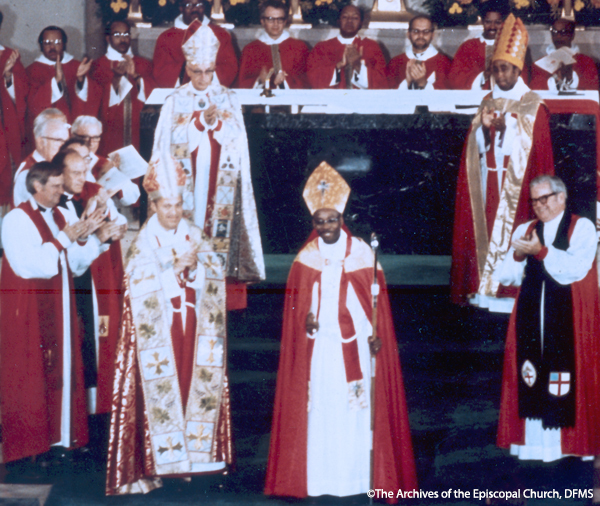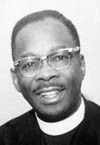Leadership Gallery
The Right Reverend Quintin Ebenezer Primo, Jr., 1913-1998
What Martin Luther King did for this country, Quintin Primo did for this church.
- The Reverend Rod Welles, 1998
Son of a priest from British Guiana, Quintin Ebenezer Primo, Jr. was the first African American bishop elected in the dioceses of Chicago and Delaware. As an advocate for the advancement of minorities in the church and American society, Primo championed the equal treatment of Black clergy and the inclusion of all racial minorities within congregations. His outspoken support of women’s ordination led him to become the first bishop to ordain women as priests in Chicago. He was active in establishing social programs benefitting society’s downtrodden and played a key role in the establishment of the African American movement within the Episcopal Church.
Consecration of the Right Reverend Quintin Primo, Jr. at the Cathedral of St. James in Chicago, September 30, 1972. In attendance were the Most Reverend John Hines, standing to the right of Primo, and the Right Reverend John Walker of Washington D.C., standing behind Hines.
Bishop Primo was born in 1913 in Freedom Grove, Liberty County, Georgia. He attended Saint Augustines’ College High School in Raleigh, North Carolina and received his diploma at Fort Valley Normal and Industrial Institute in Albany, Georgia in 1930. Primo’s theological education was extensive, including a Bachelor of Arts from Lincoln University in 1934, a Bachelor of Sacred Theology from Lincoln University three years later, a Master of Divinity from Virginia Theological Seminary in 1941, and a certificate from Yale University School of Alcohol Studies. He was the recipient of doctoral degrees from Seabury-Western Theological Seminary, St. Augustine’s College, Virginia Theological Seminary, and General Theological Seminary.
Primo’s parochial ministry spanned across Florida, North Carolina, and New York. Prior to his entering the priesthood, he held positions in the field of education, as assistant principal at St. Alban’s Vocational School, Christ Church in Coconut Grove, Florida from 1937 to 1938, and the following two years as a teacher of social studies at Carver High Public School in Delray Beach, Florida. He was ordained a deacon in 1941 and priest in 1942. His first ministerial position was as curate at St. Agnes in Miami, Florida from 1941 to 1942. Primo transferred to North Carolina in 1942 where he served as priest-in-charge of three congregations: St. Gabriel in Rutherfordton, Good Shephard in Tryon, and St. Andrew in Green River until 1943, and as priest-in-charge at St. Stephen in Winston-Salem from 1944 to 1945.
In 1945 Primo moved to New York where he continued his parochial service as priest-in-charge at the parishes of St. Timothy in Brooklyn until 1947 and St. Simon in Rochester for the next fourteen years, and as their first rector from 1961 to1963. While at St. Simon, the congregation realized parish status after thirty-five years as a mission. While raising up the parish, he also founded St. Simon’s Community Center. Similarly, Primo went on to Wilmington, Delaware in 1963 where he obtained parish status for St. Matthew’s Church, ministering first as priest-in-charge and then as their first rector the following three years. His contributions extended beyond the church walls with the establishment of St. Michael’s Day Nursery, St. Matthew’s Tutorial and Job Training Program, and as co-founder of the Community Training Foundation, Inc.. During his tenure as rector at St. Matthew in Detroit from 1969 to 1972, Primo successfully merged St. Matthew, a predominantly Black congregation, with St. Joseph, a predominantly white congregation at a time of acute racial division. His admirable leadership skills elevated him to the office of Bishop Suffragan of Chicago in 1972 – a position never before achieved by a Black priest in the history of the diocese. Upon his retirement in 1985, Primo returned to Delaware where he served as Interim Bishop for ten months.
Primo’s service to the greater Episcopal Church exemplified a commitment to equality and justice that matched his pastoral care. He served as Episcopal voting representative for Project Equality of Delmarva, as chairman-treasurer for the Ad Hoc National Clergy Committee to remove discriminatory hiring and personnel practices in the Episcopal Church, and with the Episcopal Action Group on Poverty of the Episcopal Church. Primo also committed many years to the Living Church Foundation. He held elected deputy and alternate positions to General Convention from 1952 to 1969.
In his bold resoluteness to effect change for civil rights, he led approximately half the Black clergy in 1967 to sign “A Declaration by Priests who are Negroes,” which confronted the discrimination of black clergy within the church, particularly in terms of how rarely African American clergy advanced to executive positions, and the lack of recognition for their contributions to urban and racial work. The following year, Primo advanced his efforts in this area and co-founded the Union of Black Clergy and Laymen (UBCL), which continued to speak out on racial discrimination affecting Black priests and present in policy making. Primo served as the first national president of this group of African American clergy and laity. The Union initially explored the option for Black clergy and congregations to leave the Episcopal Church and revive the African Orthodox Church. Ultimately, the Union inherited the role of ESCRU, and evolved to represent the Black voice within the Episcopal Church and was renamed the Union of Black Episcopalians (UBE) in 1971.
Primo’s civic commitments impacted a broad spectrum of American society. He served as a commission member under Governor Terry of Delaware and as a board member for the Wilmington Council of Churches, United Negro College Fund, Planned Parenthood of Wilmington, and the National Conference of Christians and Jews. The Urban Center of St. Barnabas, co-founded by Primo in 1979, served as a Chicago-based community outreach center, and evolved into the Quintin E. Primo Endowment Fund at St. Augustine College in Raleigh, North Carolina. Primo can also be commended for his leadership roles in New York’s State NAACP and the Commission for Human Rights. The Primo Women’s Center was established in 1997 as a shelter for homeless women and children in Chicago, offering after-school and job-training programs. The Center is now chaired by his son, Quintin E. Primo III. The Primo Lecture Series (PLS), or Quintin E. Primo, Jr. Fund for Racial Justice, also sponsors programs to continue the dialogue on racial equality.
Reverend Primo died of heart disease on January 15, 1998 in Hockessin, Delaware. He was survived by his wife Winifred (formerly Thompson) and three children. His legacy lives on through the organizations he founded. Primo’s autobiography, The Making of a Black Bishop, relates the journey of his and his father’s careers within the Episcopal Church. [Sources]



